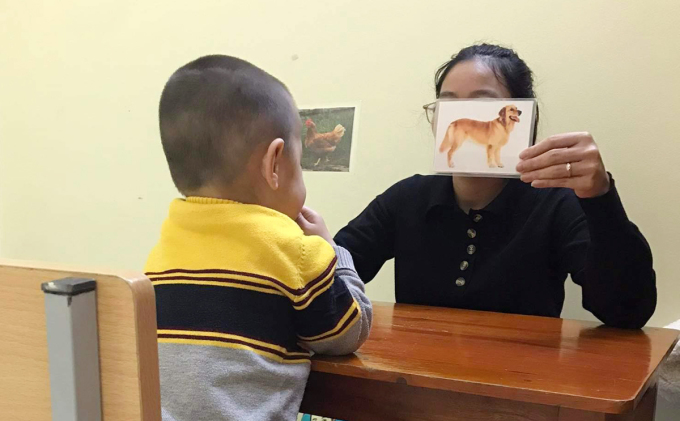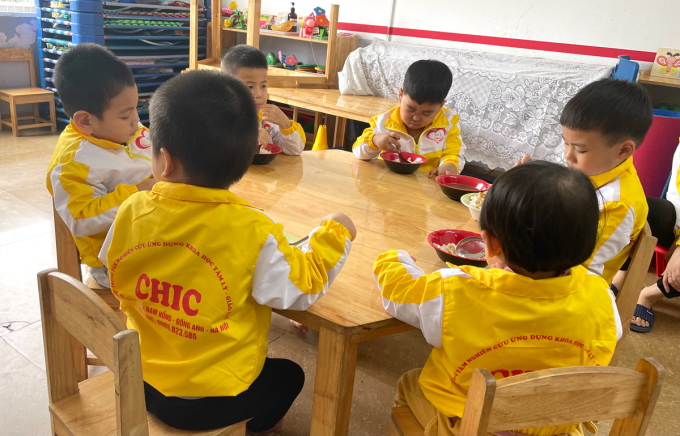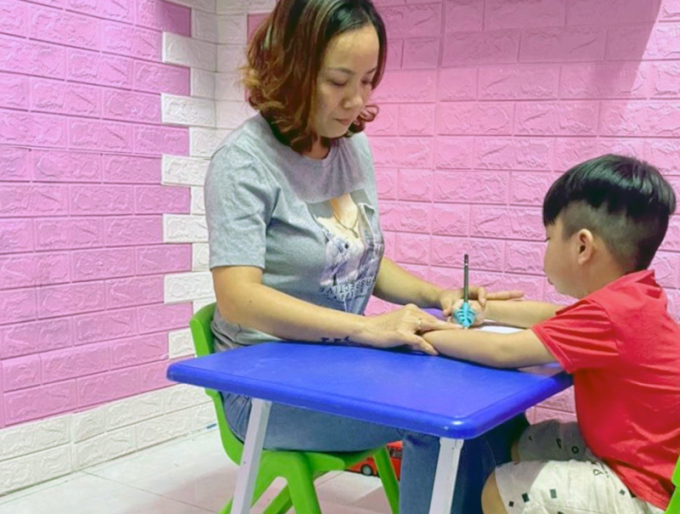Bui Thi Cuc was shocked to discover her two-year-old twin children were talking nonsense and mimicking the behaviors of her autistic eldest son.
Khac Dung, 4, was diagnosed with autism when he was just over two.
Before the fourth Covid wave struck in April last year he attended a kindergarten near his home in Thang Long Commune, Nong Cong District, and then a special education center 30 kilometers away in Thanh Hoa Town in the namesake province.
He improved greatly after two months of therapeutic programs.
“He was talking less gibberish and was able to pronounce words more clearly. If he had kept receiving intervention, I am sure he would have improved even more,” the 33-year-old says.
But her husband got a herniated disc and could not work for 10 months, leaving the family of four adults and three children depending solely on her salary as a garment worker who earned a maximum income of VND6 million ($262.43) a month if she worked overtime.
 |
|
One of Cuc’s sons at a special education school in Thanh Hoa Province, April 1, 2022. Photo acquired by VnExpress |
As a result Dung had to drop out of the special education center. Last year he stayed at home with his younger brothers in the care of their grandparents who are both over 70 years old.
In October Cuc realized that the twins, Dat and Dang, were imitating Dung’s, including speaking gibberish and walking on their toes.
“There is no greater pain than knowing all three of my children have been diagnosed with language disorders,” she says.
The latest edition of U.K. medical journal Lancet says there are 78 million people in the world with autism spectrum disorder (ASD), or 1 percent of the world’s population, and most of them are unsupported.
The pandemic affected every child, but children with ASD seemed to suffer the most.
A late 2021 study by the Simons Foundation Powering Autism Research (SPARK) in the U.S. said 3,500 parents found that the negative changes in children with autism were three times higher than in children with other neurotic disorders.
Another study of 400 parents in China found more than a third saying their child had gotten worse during the school closure, becoming restless, easily distracted, angry, and fussy.
“During the pandemic, a lot of autistic children and their families struggled to get proper care, education or help,” Dr Tran Van Cong of the VNU University of Education, who is also a member of the International Society for Autism Research, says.
He has seen many cases like Dung where children had made a lot of progress with therapy but recidiving when Covid prevented them from attending classes.
He gave an example of a child who received therapy at a very young age but had to take a break due to the pandemic. Now the four-year-old child is unable to catch up with others of the same age.
 |
|
Autistic children have lunch at a special education school in Hanoi’s Dong Anh District, March 29, 2022. Photo by VnExpress/Phan Duong |
Ha Thi Nhu Quynh, who has a master’s degree in special education, says neurotypical children with language disorders can improve over time, but children with autism, without intervention from special education teachers or family, will lose their language skills and resort to instinctive behaviors.
Quynh’s special education center has a pair of twins 27 months old who enrolled in April 2021. One suffers from speech delay and the other has ASD. But just one month after starting, their school had to close for one year due to Covid.
Quynh says: “The older kid has improved and can construct sentences. But the child with autism has completely forgotten what he learned. He now screams more and is unable to complete even the simplest tasks”.
With reduced incomes, tuition fees for special education classes have also become a problem for many families.
Tran Thi Dung, principal of three special education institutions in Thanh Hoa Province, says before Covid the one in Sam Son Commune used to have about 40 students, but only 10 attend now.
“The children’s parents rely on tourism for a living. But the pandemic drastically reduced their income, and their children have lost the opportunity to go to school.”
Many parents were also distressed by having to deal with autistic children’s worsening behavior.
Cuc says all her children want to speak and express themselves, but their language disorder means they are unable to, making them troublesome.
Sometimes the adults lose patience and scold them, but when they realize the children’s disruptive behaviors are merely related to basic needs such as thirst, hunger and hygiene they feel great anguish.
“I have always blamed myself for having too many kids and not giving Dung much attention after I gave birth to the twins,” Cuc says. It was a big mistake to stop sending him to the special education school, she says.
Cong says parents themselves were helpless at times during the pandemic, not knowing what to do or where to start.
For many families, economic security and livelihoods are priorities, and so it is not easy to tell them to keep sending their kids for intervention.
Experts recommend that parents should attend online training programs in behavioral intervention and determine their priorities, saying it is important to remember that children with autism can make good progress with timely and active intervention.
Realizing her students were affected by the pandemic, Cao Thu Hang, the principal of a special education system in Hanoi, has set up a training program for parents to learn at home. In the past year she has organized seven such courses for 20-30 parents each.
 |
|
Phuong Thuy teaches her autistic son at home in Phu Quoc Island. Photo courtesy of Thuy |
Phuong Thuy, 38, of Phu Quoc Island is glad that she attended the course and has helped her son, Khanh Hy, make great progress in just the last three months.
Hy was diagnosed with attention deficit hyperactivity disorder (ADHD) and autism more than a year ago, and she tried sending him to two special education centers in HCMC and Rach Gia town in Kien Giang Province.
But he did not make progress over the course of half a year.
“Since then I have attended about 15 different parent-training courses, especially during lockdowns,” Thuy says.
Now she knows what stage her son is currently in and based on that sets up a proper lesson plan to teach him at home.
The boy who struggled to speak three letters can now form a sentence and say what he likes or dislikes. From being a boy who could not sit still for four minutes, he can now concentrate on studying for 15 minutes straight.
Thuy also gives her son exercises to improve his cognitive skills like walking on balance bridges and in zigzag lines.
“I have found that parents can’t rely on special education teachers alone. The best thing to do is provide support for autistic kids both at school and at home.”
Hang says the pandemic has caused parents to realize the importance of equipping themselves with knowledge and skills to help their autistic children at home and know if the teachers are teaching them correctly.
Cuc sent all three of her kids back to the special education school at the beginning of this month.
Knowing the family’s situation, the school waived the fees for one child. But Cuc and her husband still have to spend VND750,000. They borrowed from a bank and used part of the loan for tongue surgery for their three children to help them with speech. They recently took another loan to send them to the school.
“I don’t mind spending large amounts of money as long as my children receive proper intervention so that they can talk, communicate and integrate with friends,” she says.
- Reduce Hair Loss with PURA D’OR Gold Label Shampoo
- Castor Oil Has Made a “Huge” Difference With Hair and Brow Growth
- Excessive hair loss in men: Signs of illness that cannot be subjective
- Dịch Vụ SEO Website ở Los Angeles, CA: đưa trang web doanh nghiệp bạn lên top Google
- Nails Salon Sierra Madre
 VnExpress News The News Gateway of Vietnam
VnExpress News The News Gateway of Vietnam





